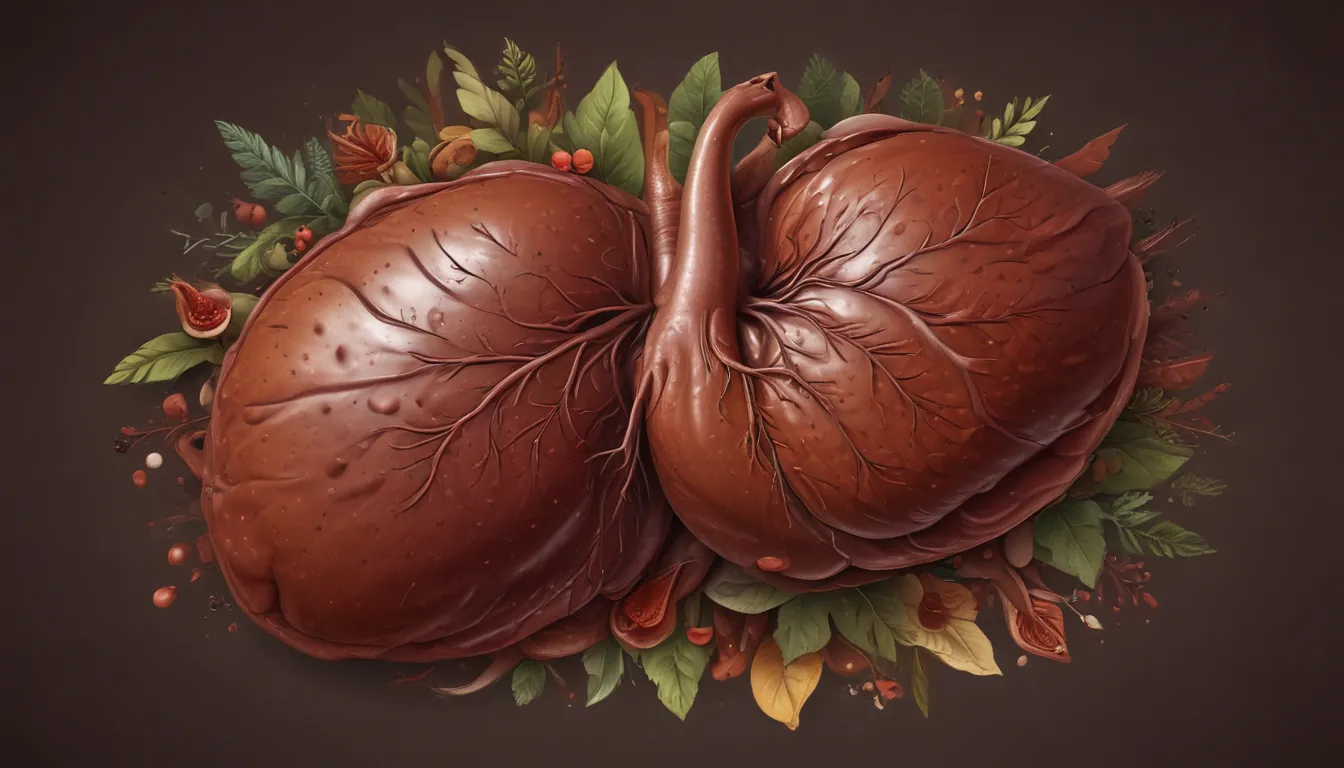The pictures in our articles might not always show exactly what the text is talking about. We use these images to make the article more interesting and eye-catching. They are there to add to the text, but not to replace it or show every detail.
Are you intrigued by the inner workings of your body and curious about the important roles your organs play in keeping you healthy? If so, the liver is a powerhouse worth exploring! From filtering toxins to producing essential proteins, the liver is an organ that truly does it all. Join us as we delve into 15 fascinating facts about the liver that will leave you in awe of its incredible capabilities and resilience.
Unlocking the Marvels of the Liver
The liver is not just any organ; it is a superhero powerhouse that performs over 500 different functions vital to your well-being. It filters toxins, produces bile for digestion, stores essential nutrients, and maintains blood glucose levels. This multitasking marvel is crucial for your overall health and requires your care and attention to keep it functioning optimally.
Unveiling the Largest Internal Organ
Did you know that the liver is the largest internal organ in the human body, weighing an average of 3 pounds? Nestled in the upper right abdomen, below the diaphragm and protected by the rib cage, this remarkable organ is a true standout in the intricate landscape of our bodies.
The Resilient Regeneration Ability
One of the most awe-inspiring features of the liver is its ability to regenerate itself. Even if up to 75% of the organ is damaged or removed, it can grow back to its original size within a matter of months. This remarkable regenerative power showcases the liver's resilience and adaptability.
Detoxification Supercenter
With its detoxification prowess, the liver acts as a center for purging harmful substances from the body. From alcohol and drugs to environmental pollutants, the liver metabolizes toxins and converts them into less harmful compounds that can be eliminated. It is truly a detox hero in action!
Metabolism Marvel
As a key player in metabolism, the liver breaks down carbohydrates, proteins, and fats to provide energy for the body. It also produces cholesterol, converts excess glucose into glycogen for storage, and regulates various metabolic processes essential for overall health.
Blood’s Guardian and Filter
The liver filters approximately 1.5 liters of blood per minute, removing toxins, dead cells, and bacteria to maintain a clean and healthy bloodstream. Additionally, it produces immune factors that aid in fighting infections and preserving a robust immune system.
Iron Storage and Supply
Storage of excess iron in the form of ferritin is another vital role the liver fulfills. This stored iron can be released as needed for the production of red blood cells necessary for oxygen transport throughout the body. The liver's iron management contributes to overall blood health.
Dynamic Duo: Liver and Gallbladder
In the realm of digestion, the liver and gallbladder form a dynamic duo. While the liver produces bile essential for fat digestion, the gallbladder stores and concentrates this bile. When fats need breaking down in the small intestine, the gallbladder releases bile into action.
Blood Glucose Stability Steward
Maintaining stable blood glucose levels is a critical responsibility of the liver. It stores excess glucose as glycogen and releases it when the body requires an energy boost. By managing blood sugar levels, the liver ensures a balanced internal environment.
Vitamin Vault
The liver serves as a repository for essential vitamins such as A, D, E, K, and B12, ensuring a steady supply for the body's needs. These vitamins play pivotal roles in vision, bone health, blood clotting, energy production, and other vital bodily functions.
Blood Protein Producer
Playfully referred to as the body's protein factory, the liver produces important blood proteins like albumin and clotting factors. These proteins contribute to blood pressure maintenance, nutrient transport, and proper blood clotting to prevent excessive bleeding.
Hormone Harmony Maestro
As a key player in hormone regulation, the liver metabolizes hormones to maintain their balance in the body. Its role in regulating hormones essential for growth, metabolism, and reproduction underscores its importance in overall hormonal harmony.
Vulnerability and Safeguarding
Although resilient, the liver is susceptible to various diseases such as hepatitis, cirrhosis, and fatty liver disease. Regular health check-ups, a wholesome diet, and prudent alcohol consumption are crucial for safeguarding the liver from potential damage.
Gender Variances
Studies have revealed differences between men and women in liver size, metabolism, and susceptibility to certain liver ailments. These variances can impact the diagnosis and treatment of liver-related conditions, highlighting the need for tailored approaches based on gender.
Nurturing a Supportive Lifestyle
Upholding a healthy lifestyle is paramount for liver health and well-being. Engaging in regular exercise, adopting a balanced diet, limiting alcohol consumption, and minimizing exposure to toxins are essential practices to keep your liver thriving.
Appreciating the Remarkable Liver
The liver is a truly extraordinary organ that deserves our attention and care. From its vast array of functions to its resilience and importance in maintaining overall health, the liver stands as a beacon of vitality within our bodies. So, let's raise a toast to this hardworking organ and commit to nurturing its well-being.
Wrapping Up with Liver Wellness
In conclusion, the liver plays an indispensable role in our health and vitality. By understanding its functions and quirks, we can better support its optimal functioning through healthy lifestyle choices. Remember, prevention is key, and by taking proactive steps to care for our liver, we can enhance our well-being and quality of life.
FAQs: Exploring Liver Queries
Q: What is the liver's function?
A: The liver performs numerous functions, including detoxification, metabolism, bile production, and storage of essential nutrients.
Q: Can the liver regenerate itself?
A: Yes, the liver has the remarkable capacity to regenerate up to 75% of its total mass within weeks of damage.
Q: What causes liver damage?
A: Factors like excessive alcohol consumption, viral infections, certain medications, and poor diet can contribute to liver damage.
Q: How do I maintain a healthy liver?
A: To support liver health, maintain a balanced diet, exercise regularly, limit alcohol intake, and stay hydrated.
Q: What are warning signs of liver issues?
A: Common signs include jaundice, abdominal pain, fatigue, nausea, and changes in urine and stool color.
Q: Can liver diseases be cured?
A: Treatment for liver diseases varies, with lifestyle changes, medications, and transplantation being options depending on the condition.
Q: How long can one live with liver failure?
A: Survival rates for liver failure vary based on severity and treatment availability, with a liver transplant sometimes necessary for survival.
Q: Does the liver aid in digestion?
A: Yes, the liver produces bile critical for fat digestion and absorption in the small intestine.
Embracing Trustworthy Knowledge
Our dedication to delivering accurate and captivating content is at the core of our mission. Each fact shared on our platform stems from contributions by real users like you, offering a diverse range of insights and knowledge. Through meticulous editorial review processes, we ensure that the information we provide is not only engaging but also credible. Trust in our commitment to quality and authenticity as you explore, learn, and grow with us.
Remember, your liver is a remarkable organ that continually works to keep you healthy and thriving. By understanding its functions and needs, you can cultivate a supportive environment for your liver's well-being. So, here's to a healthy liver and a vibrant life ahead!






